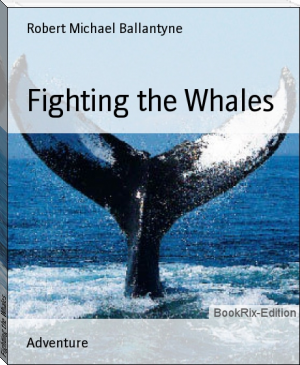The Wild Man of the West - Robert Michael Ballantyne (korean ebook reader .txt) 📗

- Author: Robert Michael Ballantyne
Book online «The Wild Man of the West - Robert Michael Ballantyne (korean ebook reader .txt) 📗». Author Robert Michael Ballantyne
"Tell 'em they're a set o' lyin' thieves," said Big Waller. "I guess we'll have nothin' to say to 'em wotiver."
"Oui, et give to dem mine complements," added Gibault, "an' say we ver' moch 'blige by dere goodness, mais dey vill all be shooted if dey not go away queek."
Redhand did not give these polite messages to the Indian, but on returning to him he presented him with a piece of tobacco, and advised him to continue his journey without loss of time, as the buffaloes were travelling south and might be out of the way when they reached the prairie.
Whether the Indians felt angry or not it is impossible to say. They seemed indifferent to their cool reception by the trappers, and soon after rode off at full speed, in a direction that led _away_ from the Mountain Fort, a circumstance which still further confirmed Redhand in his suspicions.
After an eager, hasty consultation, it was resolved that they should follow the savages, and if their trail was found to diverge, as was fully expected, towards the fort, that they should endeavour to pass them in the night, and proceed by forced marches, in order to get there in time to warn the fur-traders of their impending danger.
In less than an hour after the Indians left them, the trappers were galloping after them in hot haste. During the course of the day they found that the trail doubled back, as they had anticipated, so, making a wide detour, they headed the Indians, and during the afternoon got a little in advance of them on their way to the Mountain Fort.
But the trappers had a subtle enemy to deal with. Just as the Indians were about to encamp that night for a few hours' rest, they chanced to diverge a short way from the direct line of march, and, in doing so, crossed the tracks of the trappers. A halt was called, and a minute inspection of the tracks made. One of the savages galloped back on them a considerable distance, and soon returned with the information that they led towards the camp of the pale-faces. From the appearance of the hoof-prints they knew that they were fresh, and thus at once guessed that their true intentions had been suspected, and might yet be frustrated by the trappers. Instead of encamping, therefore, they pushed on at full speed and very soon came up with the white men. It was a dark night, so that they could not see far in advance of them, and thus it happened that the two parties, on entering a narrow defile, almost rode into each other, with a yell of fierce surprise on both sides.
As there were at least fifty Indians, Redhand thought it better to avoid a doubtful combat by scattering his men through the woods, and letting each make the best of his way to the fort singly.
"Run, boys! scatter! to the fort!"
This was all that he deemed needful in the way of command or explanation. Firing a single volley at the enemy, they turned and fled.
"Foller me," shouted Waller to the bewildered Bertram, as a shower of arrows whistled past their ears. The artist obeyed mechanically, and in another moment they were flying through the wood at a pace that seemed, and actually was, reckless under the circumstances. But the Indians did not attempt to pursue. They knew that their intention had been discovered, and that their only chance of success now lay in outriding the pale-faces. The ride, in fact, became a long race, neither party making the slightest attempt to hunt up the other, but each straining every nerve and muscle to get first to the doomed fort.
The scattered trappers rode for a long time singly, but as they neared the fort, one or two of them met, and when they came first in sight of the tall flagstaff, Bounce, Redhand, and Gibault rode abreast.
McLeod was standing in front of the fort, when the three horsemen came dashing over the plain. He hastily summoned his men and closed the gate, but as the foremost rider came near, he was recognised; the gate was thrown open, and they galloped into the square. In a few hasty words their errand was explained. Arms and ammunition were served out, and six men were stationed at the gate, to be in readiness to open it to approaching friends, or to shut it in the face of foes.
But the others of the party were not so fortunate as these three. The Indians reached the fort before they did, and one of their number was left, unknown to them, in a state of insensibility near the spot where the first rencontre had taken place.
When the Indians and trappers met in the narrow defile, as before related, one of the arrows, which had been discharged very much at random, entered the shoulder of March Marston's horse and wounded it mortally. At first March thought the wound was slight, and, hearing the shouts of some of the savages not far behind him, he urged his horse forward as rapidly as the nature of the ground would admit of. Before he had gone a quarter of a mile, however, the poor steed fell, throwing March over its head. In his flight the youth's forehead came into violent contact with a branch, and he fell to the ground insensible.
His comrades, ignorant of his fate, continued their wild flight. Thus, our hero was forsaken, and left bruised and bleeding in the dark forest.
CHAPTER SIXTEEN.
MARCH GETS A SURPRISE; MORE THAN THAT, HE GETS A VARIETY OF SURPRISES-- MEETS WITH A STRANGE HUNTER--GOES IN A STRANGE FASHION TO A STRANGE CAVERN AND BEHOLDS STRANGE SIGHTS--BESIDES OTHER MATTERS OF INTEREST.
On recovering consciousness, March discovered that it was broad daylight--from which he argued in a confused sort of way that he must have lain there all night. He also discovered that his head, which ached violently, rested on the knee of some unknown individual, who bathed his temples with cold water. Looking up he encountered the gaze of a pair of soft blue eyes.
Now there is something exceedingly captivating in a pair of soft blue eyes--not that there may not be something quite as captivating in a pair of brown or black or grey eyes--but there is something singularly captivating in the peculiar style of captivation wherewith a man is captivated by a pair of blue--distinctly _blue_--eyes. Perhaps it is that their resemblance to the cerulean depths of the bright sky and the blue profundities of the ocean invests them with a suggestive influence that is agreeable to the romantic and idealising tendencies of human nature; or that the colour is (or ought to be, if it is not) emblematic of purity. We throw out this suggestion solely for the benefit of unimpassioned philosophers. Those whose hearts are already under the pleasant thraldom of black or brown eyes are incapable of forming an opinion on the abstract question.
Well, March observed, further, that below those soft blue eyes, there was a handsome Roman nose, and immediately below that a moustache, and a thick short beard of curly light-brown hair. A slight, very slight, feeling of regret mingled with the astonishment with which March passed from the contemplation of the soft blue eyes to the bushy beard. He also noted that the stranger wore a little leathern cap, and that a profusion of rich brown hair descended from his head to his shoulders.
"Ye're better, lad," said the owner of the blue eyes in that deep musical bass voice which one meets with but rarely, and which resembles strongly, at times, the low pipes of a cathedral organ.
"Thankee, yes, I'm--"
"There, don't move yet awhile. You're badly bruised, lad. I'll go fetch ye another drop o' water."
The owner of the blue eyes rose as he spoke, laid March's head softly on the ground, and walked towards a neighbouring brook. In doing so he displayed to the wondering gaze of March the proportions of a truly splendid-looking man. He was considerably above six feet in height, but it was not that so much as the herculean build of his chest and shoulders that struck March with surprise. His costume was the ordinary leather hunting-shirt and leggings of a backwoodsman, and, although deeply bronzed, his colour not less than his blue eyes and brown hair told that he was not an Indian.
As he returned, carrying a little birch-bark dish full of water in his hand, March observed that the lines of his forehead indicated a mingled feeling of anger and sadness, and that his heavy brows frowned somewhat. He also noted more clearly now the man's towering height, and the enormous breadth of his chest. As he lay there on his back with his head pillowed on a tuft of moss, he said inwardly to himself, "I never saw such a fellow as this before in all my life!"
And little wonder that March Marston thought thus, for, as no doubt the reader has already guessed, the far-famed Wild Man of the West himself stood before him!
But he did not know him. On the only occasion on which he had had an opportunity of beholding this renowned man, March had been rendered insensible just as he came on the field, and the exaggerated descriptions he had heard of him seemed quite irreconcilable with the soft blue eye and gentle manner of the hunter who had come thus opportunely to his aid. For one moment, indeed, the idea did occur to March that this was the Wild Man. It was natural that, having had his thoughts for so long a period filled with conjectures in reference to this wonderful creature, he should suppose the first tall, mysterious man he met must be he. But he dismissed the notion as untenable and absurd on second thoughts. That the blue-eyed, calm, dignified hunter who kneeled by his side, and held the refreshing water to his lips as if he were a trained sick nurse, should be the Wild Man, the man reported to be forty feet high, covered with hair, and exceeding fierce besides ugly, was out of the question. And when March shut his eyes in the full enjoyment of the cool draught, of which, poor fellow, he stood much in need, and heard the supposed Wild Man give vent to a sigh, which caused him to look up in surprise, so that he observed the mild blue eyes gazing sadly in his face, and the large head to which they belonged shaking from side to side mournfully, he almost laughed at himself for even momentarily entertaining such an absurd idea.
March Marston had much to learn--we mean in the way of reading human character and in judging from appearances. He had not yet observed, in the course of his short life, that if a blue eye is capable of expressing soft pity, it is also pre-eminently capable of indicating tiger-like ferocity. He did not consider that the gentlest natures are, when roused to fury, the most terrible in their outward





Comments (0)